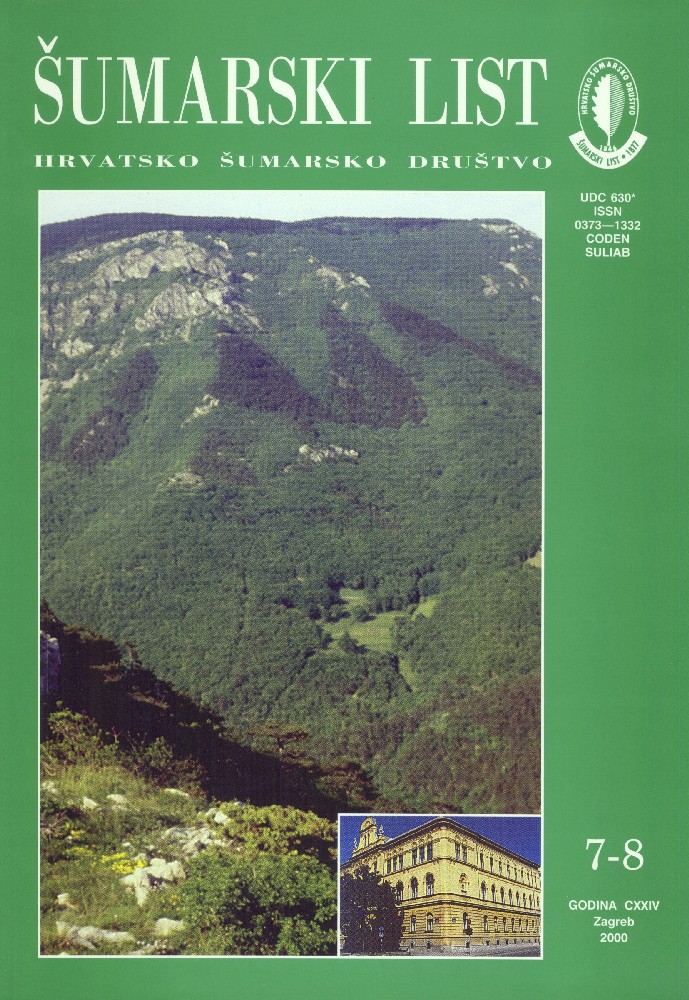
broj: 7-8/2000
pdf (36,0 MB) |
|
||||||||||||||
| IZVORNI ZNANSTVENI ČLANCI | ||
| Rubin, G. | UDK 630* 453 + 450 | |
| The Parasite Complex of the Pine Processionary Moth (Thaumetopoea pityocampa Schiff.) in the Region of the Split Forest Management pdf HR EN | 363 | |
| PREGLEDNI ČLANCI | ||
| Popijač, M., Vrebčević, M. | UDK 630* 165 + 188 + 232.3 | |
| Aplication of GIS in Forest Seed Units Divisions pdf HR EN | 373 | |
| Sabadi, R. | UDK 630* 904 + 903 | |
| The achievements of German forestry and their econometric analysis pdf HR EN | 385 | |
| PRETHODNO PRIOPĆENJE | ||
| Domac, J. | UDK 630* 238 + 831 | |
| First Results of the International Project “Socio-Economic Aspects of Bioenergy Systems” pdf HR EN | 413 | |
| Summary: Economic development is closely correlated with the availability and utilization of modern energy sources. It is now clear that current approaches to energy are nonsustainable and not renewable. Together with hydro, wind, solar and geothermal energy sources, biomass is considered as essential factor of the future renewable energy strategies. Use of biomass and different biofuels offers a wide range of social and economic benefits and contribution, especially in remote and rural areas development. One of these additional benefits, which were gained attraction, is the opportunity to create new, local jobs. It is of course that high rate of unemployment in most parts of Croatia and associated high costs and loses, should lead to increased interest for creating new permanent jobs that are economically and socially useful.The overall aim of recently launched IEA Bioenergy Task 29 is to promote the use of biomass for energy over fossil based competitor fuels in the participating countries through achieving a better understanding of the social and economic impacts of bioenergy systems at the local, regional, national and international level. In some instances this will involve linking bioenergy projects with other renewable energy supply systems such as wind, solar and small hydro. The key priority will be the analysis of the economic and social aspects and the net overall benefits of bioenergy use, and the development and promotion of tools and guidelines for their determination. Environmental considerations are also important in the overall context of this work and will be given due weight. Equally important is the biomass contribution to rural and remote areas in which biomass production for energy often takes place. Since bioenergy production and use can improve the quality of life for people living in such areas (job creation, local and regional economic activity stimulation, reduced pollution), the Task will actively incorporate such considerations. Milestones and activities planned: 2000 - detailed planning session - identification of issues and themes - selection and commissioning of scientific experts - identification of regions for the study - data gathering and collation to a previously agreed format - workshop in the UK (focus on issues and data) with invitations to targeted non-participating countries to attend (including transition countries) - establishment of an official Task web site - distribution/sharing of information of known models of relevance to the Task 2001 - publication of 1st workshop proceedings - work by scientific experts on issues - review of existing tools - selection (and if necessary development) of optimised or hybrid tools - application to regions and generation of first results - mid-Task assessment and, if necessary, re-orientation - workshop in Canada (focus on tools, guidelines and their application) - promotion planning - Internet conference 2002 - publication of 2nd workshop proceedings - final work by scientific experts on issues - presentation of tools and guidelines developed - workshop in Croatia (focus on the benefits of bioenergy systems to the community) - participation in the major linked event with major promotion effort - publication of 3rd workshop proceedings - summary document, final Task report - planning of Task continuation (if appropriate) Although the Task will emphasise the local/regional level, full account will be taken of the overall national and international framework within which the regions must work. Regions for study will be chosen so that they are complementary in nature and have a particular broad socio-economic challenge or focus. Bias will be strongly toward rural and peri-urban areas however contrasted with urban centres. Special attention will be given and linkage will be made to ongoing and planned projects and programmes which relate closely to the work proposed here, such as those projects identified by the European Commission, IPCC, UNDP, World Bank, etc. Such linkages will benefit the Task participants by drawing in additional expertise and experiences, thereby “gearing up” the efforts further whilst ensuring that there is no unintentional duplication of activities. | ||


